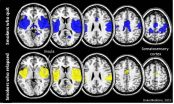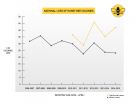No link found between PTSD and cancer risk
2015-05-13
(Press-News.org) (Boston)--In the largest study to date that examines Post Traumatic Stress Disorder (PTSD) as a risk factor for cancer, researchers from Boston University School of Medicine (BUSM), have shown no evidence of an association.
The study, which appears in the European Journal of Epidemiology, is consistent with other population-based studies that report stressful life events generally are not associated with cancer incidence. In addition to corroborating results of other studies, this large population sample allowed for important stratified analyses that showed no strong evidence of associations even among select groups of the population.
The association between stress and cancer has been discussed in scientific literature for more than 70 years. Despite plausible theories that would support this association, findings from clinical research have been mixed.
Researchers compared the rate of various cancer diagnoses among people with PTSD with the standardized cancer rate from the general population in the same time period using data from the Danish national medical and social registers. They found PTSD was not associated with an increased risk for cancer.
"The general public may have a perception that stress contributes to cancer occurrence and given the ubiquity of PTSD and cancer and their costs to individuals and society, any observed associations could have meaningful public health implications," explained corresponding author Jaimie L. Gradus, DSc, MPH, assistant professor of psychiatry and epidemiology at BUSM and an epidemiologist at the National Center for PTSD. "This study, however, provided no evidence that a severe chronic stress disorder such as PTSD is associated with cancer incidence.
According to the researchers, the large sample and long study period allowed them to examine associations that have not been studied previously as they were able to look at rare cancer outcomes and associations among important subgroups.
INFORMATION:
Funding for this study was provided by the National Institute of Mental Health (1R21MH094551-01A1).
ELSE PRESS RELEASES FROM THIS DATE:
2015-05-13
Our bodies' hormones work together to tell us when to eat and when to stop. But for many people who are obese, this system is off-balance. Now scientists have designed a hormone-like compound to suppress hunger and boost satiety, or a full feeling, at the same time. They report in ACS' Journal of Medicinal Chemistry that obese mice given the compound for 14 days had a tendency to eat less than the other groups.
In their study, Constance Chollet and colleagues targeted two main receptors in the body that help keep appetite in check. When hormones bind to ghrelin receptors, ...
2015-05-13
WASHINGTON, D.C., May 13, 2015--Policymakers and practitioners have grown increasingly interested in measures of personal qualities other than cognitive ability--including self-control, grit, growth mindset, gratitude, purpose, emotional intelligence, and other beneficial personal qualities--that lead to student success. However, they need to move cautiously before using existing measures to evaluate educators, programs, and policies, or diagnosing children as having "non-cognitive" deficits, according to a review by Angela L. Duckworth and David Scott Yeager published ...
2015-05-13
Coffee has gone from dietary foe to friend in recent years, partly due to the revelation that it's rich in antioxidants. Now even spent coffee-grounds are gaining attention for being chock-full of these compounds, which have potential health benefits. In ACS' Journal of Agricultural and Food Chemistry, researchers explain how to extract antioxidants from the grounds. They then determined just how concentrated the antioxidants are.
María-Paz de Peña and colleagues note that coffee -- one of the most popular drinks in the world -- is a rich source of a group ...
2015-05-13
Several class-action lawsuits filed recently against the makers of flushable wet-wipes have brought to light a serious -- and unsavory -- problem: The popular cleaning products might be clogging sewer systems. But whether the manufacturers should be held accountable is still up in the air, according to an article in Chemical & Engineering News (C&EN), the weekly newsmagazine of the American Chemical Society.
Jessica Morrison, assistant editor at C&EN, reports that New York City alone claims to have spent more than $18 million over six years clearing wipes from its wastewater ...
2015-05-13
Rats have more heart than you might think. When one is drowning, another will put out a helping paw to rescue its mate. This is especially true for rats that previously had a watery near-death experience, says Nobuya Sato and colleagues of the Kwansei Gakuin University in Japan. Their findings are published in Springer's journal Animal Cognition.
Recent research has shown that a rat will help members of its own species to escape from a tubelike cage. The helping rat will show such prosocial behavior even if it does not gain any advantage from it. To see whether these ...
2015-05-13
DURHAM, N.C. - Smokers who are able to quit might actually be hard-wired for success, according to a study from Duke Medicine.
The study, published in Neuropsychopharmacology, showed greater connectivity among certain brain regions in people who successfully quit smoking compared to those who tried and failed.
The researchers analyzed MRI scans of 85 people taken one month before they attempted to quit. All participants stopped smoking and the researchers tracked their progress for 10 weeks. Forty-one participants relapsed. Looking back at the brain scans of the 44 ...
2015-05-13
Beekeepers across the United States lost more than 40 percent of their honey bee colonies during the year spanning April 2014 to April 2015, according to the latest results of an annual nationwide survey. While winter loss rates improved slightly compared to last year, summer losses--and consequently, total annual losses--were more severe. Commercial beekeepers were hit particularly hard by the high rate of summer losses, which outstripped winter losses for the first time in five years, stoking concerns over the long-term trend of poor health in honey bee colonies.
The ...
2015-05-13
MANHASSET, NY -- The Feinstein Institute for Medical Research, the research arm of the North Shore-LIJ Health System, and SetPoint Medical Inc., a biomedical technology company, today released the results of research on the therapeutic potential of vagus nerve stimulation. In a paper published by Bioelectronic Medicine, Kevin J. Tracey, MD, and his colleagues at the Feinstein Institute, explore how low-level electrical stimulation interacts with the body's nerves to reduce inflammation, a fundamental goal of bioelectronic medicine.
Prior to this study, it was not understood ...
2015-05-13
Scientists at The University of Manchester have made an important discovery about how certain cells stick to each other to form tissue.
The team from the Faculty of Life Sciences studied how cells in the skin and heart are bound together through structures called desmosomes. They wanted to understand how these junctions between the cells in the tissue are so strong.
Desmosomes are specialised for strong adhesion. They bind the tissue cells together to resist the rigours of everyday life and their failure can result in diseases of the skin and heart, including sudden ...
2015-05-13
A part of the performance degradation mechanism of the advanced, electrodeless, helicon plasma thruster with a magnetic nozzle, has been revealed by the research group of Dr. Kazunori Takahashi and Prof. Akira Ando at Tohoku University's Department of Electrical Engineering.
An electric propulsion device is a main engine, and a key piece of technology for space development and exploration. Charged particles are produced by electric discharge and accelerated, i.e. momentum is transferred to them via electromagnetic fields. The thrust force is equivalent to the momentum ...
LAST 30 PRESS RELEASES:
[Press-News.org] No link found between PTSD and cancer risk



